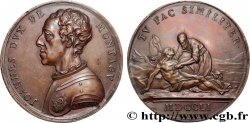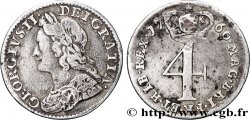fme_1049472 - GREAT-BRITAIN - GEORGE II Médaille, Monument à John Milton
100.00 €(Approx. 117.00$ | 87.00£)
Quantity
Add to your cart

Type : Médaille, Monument à John Milton
Date: 1737
Metal : bronze
Diameter : 52 mm
Orientation dies : 12 h.
Engraver TANNER J. S.
Weight : 60,39 g.
Edge : lisse
Puncheon : sans poinçon
Coments on the condition:
Patine hétérogène avec la présence de traces d’oxydation, d’une légère usure sur les reliefs ainsi que quelques rayures et marques de manipulation
Catalogue references :
Eimer.542 - Medallic Illustration II524 83
Obverse
Obverse legend : IOHANNES. - MILTONUS. .
Obverse description : Buste drapé, à droite, signé sur le tranché du bras : TANNER F..
Reverse
Reverse legend : E / MARMORE / IN ECCLESIA / SANCTI PETRI / APUD WESTMONASTERIUM / ERECTORE / GULIELMO BENSONO ARM: / M DCC XXXVII / RYSBRACHIUS / SCULPSIT..
Reverse description : Légende en 11 lignes (référence au monument en marbre de Saint-Pierre à Westminster en l'honneur de Milton) .
Commentary
John Milton (1608 - 1674) est un poète et un pamphlétaire anglais, célèbre pour être, en particulier, l’auteur de plusieurs poèmes épiques, Le Paradis perdu, Le Paradis reconquis et Samson Agonistes, et aussi de sonnets.
Né en 1608 à Londres, alors dans le Royaume d'Angleterre, il fréquente de prestigieux établissements, St Paul's à Londres et Christ's College à Cambridge. Cependant, son désaccord avec son tutor (« directeur d'études ») rend son éducation, dans un premier temps, tumultueuse. À bien des égards, cependant, c'est un autodidacte qui ne cesse d'étudier et approfondir ses connaissances en langues anciennes et modernes, philosophie, littérature et théologie.
Après la victoire puritaine du Commonwealth de l'Angleterre, il est nommé secrétaire d'État aux Langues étrangères, poste qui le conduit à représenter le nouveau régime auprès de l'étranger. Il publie de nombreux pamphlets et traités en latin ou en anglais. Sa vue baisse inexorablement et, à l'âge de 40 ans, il est complètement aveugle. Il reçoit alors l'aide d'assistants, en particulier celle du poète Andrew Marvell.
Lors de la Restauration Stuart, il est arrêté et emprisonné à la tour de Londres pendant quelques semaines, mais se voit assez rapidement libéré. Il se consacre alors à l'écriture de ses longs poèmes épiques, d'une Histoire de l'Angleterre et aussi de sonnets plus intimes, dont le célèbre On His Blindness (« Sur sa cécité »).
Il meurt le 8 novembre 1674. Il est considéré comme l'un des géants de la poésie anglaise.
(c.f. Wikipédia).
John Milton (1608 - 1674) was an English poet and pamphleteer, famous for being, in particular, the author of several epic poems, Paradise Lost, Paradise Regained and Samson Agonistes, and also of sonnets.
Born in 1608 in London, then in the Kingdom of England, he attended prestigious establishments, St Paul's in London and Christ's College in Cambridge. However, his disagreement with his tutor (\\\"director of studies\\\") made his education, at first, tumultuous.. In many ways, however, he was an autodidact who never stopped studying and deepening his knowledge of ancient and modern languages, philosophy, literature and theology..
After the Puritan victory of the Commonwealth of England, he was appointed Secretary of State for Foreign Languages, a post which led him to represent the new regime abroad.. He published numerous pamphlets and treatises in Latin and English.. His eyesight declined inexorably and, at the age of 40, he was completely blind.. He then received help from assistants, in particular that of the poet Andrew Marvell.
During the Stuart Restoration, he was arrested and imprisoned in the Tower of London for a few weeks, but was soon released.. He then devoted himself to writing his long epic poems, a History of England and also more intimate sonnets, including the famous On His Blindness..
He died on November 8, 1674. He is considered one of the giants of English poetry..
(c. f. Wikipedia)
Né en 1608 à Londres, alors dans le Royaume d'Angleterre, il fréquente de prestigieux établissements, St Paul's à Londres et Christ's College à Cambridge. Cependant, son désaccord avec son tutor (« directeur d'études ») rend son éducation, dans un premier temps, tumultueuse. À bien des égards, cependant, c'est un autodidacte qui ne cesse d'étudier et approfondir ses connaissances en langues anciennes et modernes, philosophie, littérature et théologie.
Après la victoire puritaine du Commonwealth de l'Angleterre, il est nommé secrétaire d'État aux Langues étrangères, poste qui le conduit à représenter le nouveau régime auprès de l'étranger. Il publie de nombreux pamphlets et traités en latin ou en anglais. Sa vue baisse inexorablement et, à l'âge de 40 ans, il est complètement aveugle. Il reçoit alors l'aide d'assistants, en particulier celle du poète Andrew Marvell.
Lors de la Restauration Stuart, il est arrêté et emprisonné à la tour de Londres pendant quelques semaines, mais se voit assez rapidement libéré. Il se consacre alors à l'écriture de ses longs poèmes épiques, d'une Histoire de l'Angleterre et aussi de sonnets plus intimes, dont le célèbre On His Blindness (« Sur sa cécité »).
Il meurt le 8 novembre 1674. Il est considéré comme l'un des géants de la poésie anglaise.
(c.f. Wikipédia).
John Milton (1608 - 1674) was an English poet and pamphleteer, famous for being, in particular, the author of several epic poems, Paradise Lost, Paradise Regained and Samson Agonistes, and also of sonnets.
Born in 1608 in London, then in the Kingdom of England, he attended prestigious establishments, St Paul's in London and Christ's College in Cambridge. However, his disagreement with his tutor (\\\"director of studies\\\") made his education, at first, tumultuous.. In many ways, however, he was an autodidact who never stopped studying and deepening his knowledge of ancient and modern languages, philosophy, literature and theology..
After the Puritan victory of the Commonwealth of England, he was appointed Secretary of State for Foreign Languages, a post which led him to represent the new regime abroad.. He published numerous pamphlets and treatises in Latin and English.. His eyesight declined inexorably and, at the age of 40, he was completely blind.. He then received help from assistants, in particular that of the poet Andrew Marvell.
During the Stuart Restoration, he was arrested and imprisoned in the Tower of London for a few weeks, but was soon released.. He then devoted himself to writing his long epic poems, a History of England and also more intimate sonnets, including the famous On His Blindness..
He died on November 8, 1674. He is considered one of the giants of English poetry..
(c. f. Wikipedia)








 Report a mistake
Report a mistake Print the page
Print the page Share my selection
Share my selection Ask a question
Ask a question Consign / sell
Consign / sell
 Full data
Full data










